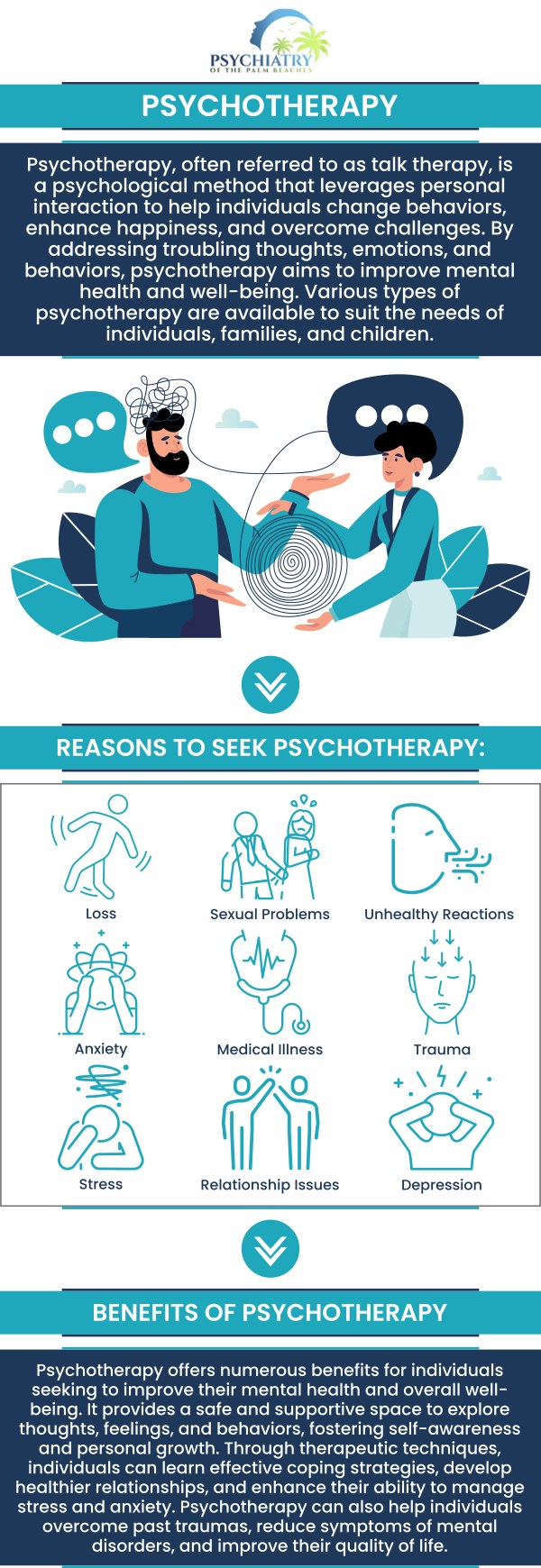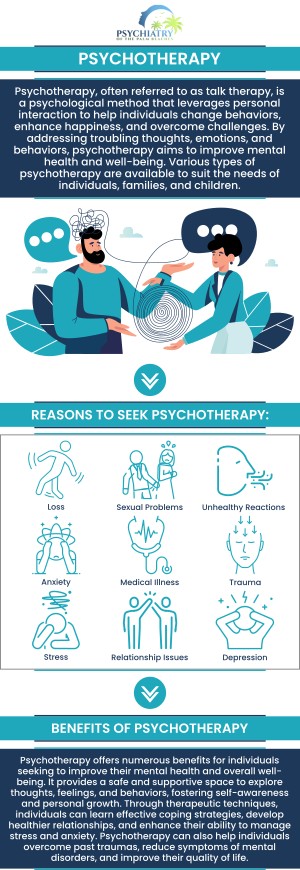What to Expect from a Psychotherapy Session?
Psychotherapy may help you better understand and overcome the difficulties that are limiting you from having a full and healthy life. The psychotherapist will work closely with you to develop the optimal treatment plan for you. Anyone who is coping with life’s challenges, excessive stress, adjusting to a new life situation or medical condition, or who has a mental health or behavioral disorder can benefit from psychotherapy sessions available at Psychiatry of the Palm Beaches. For more information, contact us today or book an appointment online. We have convenient locations to serve you in Jacksonville, Boynton Beach, Palm Beach Gardens, Stuart, Royal Palm Beach, Port St. Lucie, Melbourne, Fort Lauderdale, and Jupiter, FL.




Table of Contents:
What should I expect from my psychotherapist?
What is a psychotherapist supposed to do?
What happens in a psychotherapy session?
How long does it take to see results from psychotherapy?
Working with a psychotherapist involves sessions with a mental health professional to address mental health concerns or life challenges. The reasons for seeking individual therapy are diverse, ranging from conditions such as anxiety and depression to relationship struggles, addiction, or a desire for personal growth.
Psychotherapy sessions are not exclusively for those in times of crisis or even with a specific mental health condition, rather they can help individuals cope with and manage any mental health concern.
Psychotherapists employ forms of talk and behavioral therapy to challenge negative thinking and improve the mental health of individuals. This collaborative treatment is grounded in the relationship between the individual and the psychologist, emphasizing open dialogue. The therapeutic process aims to uncover and address thought and behavior patterns hindering overall well-being.
Through treatment, individuals not only resolve current challenges, but also acquire a skillset to help them better navigate life’s hurdles and stressors.
Different therapy styles and techniques are employed based on individual needs, as therapy is not a one-size-fits-all approach. The first session involves the therapist asking questions to understand the individual’s triggers, challenges, symptoms, goals, and expectations.
Psychotherapists assist individuals in handling a broad spectrum of mental and emotional challenges. They can assess, diagnose, and treat various mental health conditions. Additionally, they offer a confidential, supportive, and secure environment for individuals to express their thoughts and concerns openly.
The specific actions of a psychotherapist depend on the unique needs of each patient, but fundamentally, they collaborate with individuals to enhance their mental health.
This collaboration may include employing different talk or behavioral therapies aimed at recognizing triggers, addressing negative thought patterns, exploring self-perception, and fostering positive changes in thoughts, feelings, behavior, and their relationship with one another.
In a psychotherapy session, the therapist explores various aspects of the individual’s life, including coping mechanisms, triggers, and symptoms. This initial meeting helps set goals for therapy and establish expectations. Ahead of their initial psychotherapy session, individuals may wish to document their concerns and triggers, prepare their goals, and determine what they hope to achieve from therapy.
However, if they are unsure about any of these elements, psychotherapists can work with patients to identify them collaboratively. Different therapists employ diverse strategies, and the individual gains a sense of the therapist’s style during this process.
The therapeutic journey involves opening up about thoughts and feelings, allowing the therapist to understand the individual better and provide personalized assistance. Because of this, patients need to be open and honest with themselves and the therapist to the best of their ability during sessions.
Depending on patient needs, therapists may provide patients with therapeutic tactics to practice, such as breathing exercises or meditation, aimed at regulating emotions.
How long it takes for patients to see results from psychotherapy varies based on individual needs, the type of therapy, and personal preferences. Some individuals find short-term treatment effective, lasting as little as six to eight sessions, particularly for specific issues.
Others with deeper concerns may engage in therapy for several months or even years. The frequency of sessions, whether weekly or less frequently, is adapted to individual needs. The improvement timeline is similarly varied, as no two patients are the same.
Psychotherapy addresses a broad range of reasons, and the experience is unique to each individual, with therapists trained to handle diverse situations. Ultimately, the duration and effectiveness of psychotherapy are personalized to the individual’s specific circumstances and goals. It is a collaborative effort aimed toward long-term improvement over time, offering individuals the opportunity to gain insights and influence positive changes in their lives by conquering their current issues and gaining the tools to take on future challenges.
The therapeutic journey is a personal process that evolves according to the individual’s progress and the goals they aim to achieve.
Psychotherapists help people deal with a wide range of emotional and mental disorders. They can evaluate diagnose, and treat a variety of mental health issues. Psychotherapy is available at Psychiatry of the Palm Beaches. For more information, contact us today or book an appointment online. We serve patients from Boynton Beach FL, Delray Beach FL, Palm Beach Gardens FL, Jupiter FL, Stuart FL, Palm City FL, Royal Palm Beach FL, Wellington FL, Citrus Ridge FL, Jacksonville FL, Riverside FL, Port St. Lucie FL, Beau Rivage West FL, Melbourne FL, Palm Bay FL, Fort Lauderdale FL, Hollywood FL, Jupiter FL, North Palm Beach FL, and surrounding areas.
Check Out Our 5 Star Reviews



Additional Services You May Need
▸ Mental Wellness
▸ Relationship Coaching
▸ Depression and Mood Disorders
▸ Women’s Health
▸ Panic Disorder
▸ Medications Management
▸ Men’s Health
▸ Individual Psychotherapy
▸ Bipolar
▸ ADHD
▸ Geriatric Mental Health
▸ Couple’s Counseling
▸ Obsessive Compulsive Disorder
▸ Social Phobia Treatment
▸ Eating Disorders
▸ Post Traumatic Stress Disorder
▸ Psychotic Disorders


